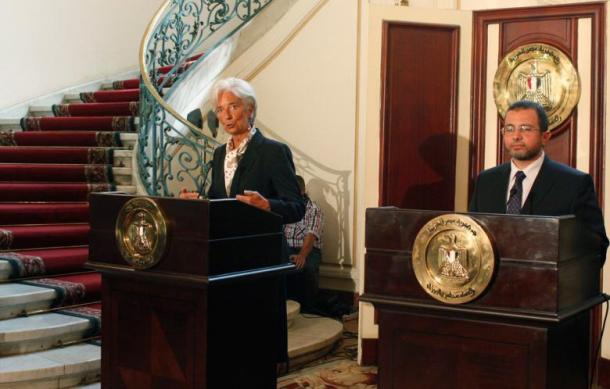
At a critical stage, during which Egypt is rearranging and resetting its priorities and strategies, it is of great importance to remember that the foundations of proper economic and political management require an integrated vision. This vision must precede both micro-level steps and an outline for the main strategic goals of a country, before starting tactical projects. This specifically is the main problem intensifying the hesitancy to accept or reject the IMF’s credit facility.
Hence, the dilemma facing decision makers is about an integrated economic vision, rather than a dilemma of borrowing as a micro-level policy in of itself; especially since the money is being borrowed from an international political institute like the IMF. The step of taking a loan might be viable, however I am more concerned about avoiding moving forward with a flawed vision or with a complete lack of vision at all.
In fact, this uncertain strategic scene leads us to automatically look at the lack of necessary information, or a lack of transparency, about the conditionality of the loan and its economic and political consequences. This is compounded by the fact that the government has not yet disclosed the country’s economic situation fully and accurately, including the volume of its foreign reserves, the budget deficit, etc.
At this time, in an unprecedented move, Malaysia rejected an IMF loan. It is not necessary to go into the reasons the IMF loan was rejected, as that has been done by many before me. However, what caught my attention was Malaysian Prime Minister Mahathir Mohammed’s decision to establish a national council, comprised of investors, businessmen and economists with different ideologies. The council held long daily session for two years until they were able to emerge from the crisis. This highlights that critical decisions affecting the future of a country, politically and economically, cannot be monopolized by one person’s point of view regardless of his/her proficiency.
My suggestion, which is quite similar to this idea, is to launch workshops in which Egypt’s economic experts from all schools of thought, be it Islamic, capitalist or socialist, both at home and abroad, can participate. Through these workshops, they can collect the varied yet valuable ideas creating a pool of innovative solutions that break away from a pattern of a narrow repetitive vision for solving the liquidity and financing crises that we face. At the very least, they will form an integrated vision that helps policy makers in the decision making process, rather than insisting that there is no other alternative for this step.
Talk about change in IMF policies after the disastrous international financial crisis in 2008 cannot be guaranteed, since the main rule that cannot be changed is the burden of the loans either in the form of financial commitment or in the form of restricting the political decision, the latter of which is more serious. Additionally, our current situation does not allow us to bet on the goodwill of others.,
The approval of the World Bank loan will have a positive impact on raising Egypt’s credit rating, which will result in more international confidence in the economy and hence attract more investments – however, why is this the only approach being considered? This is an another example of stereotypical thinking which could be guarded against with Egyptian diplomacy taking up a distinguished role in the coming period, by opening new doors and adopting new strategies in building foreign relations. For instance, Middle East Rating and Investors Service chairman, Amr Hassanein told Egyptian daily al-Ahram ,after President’s Morsi visit to China, "International credit rating agencies monitor the movements of the presidents and what they do in terms of signing agreements that attract real investments, and President Morsi’s visit to China sends a strong message to the world that the new Egyptian regime is trying to enhance its relations with global economic powers, away from any ideologies."
I am still interested in focusing on the main outline since I am convinced that neither one article nor a series of articles can provide ready-made solutions. That said, it is worthwhile to suggest some alternatives that can be considered and studied. One of these is opening the door to financing infrastructure projects using the Build-Operate-Transfer (BOT) system, with the condition of sustainable development that ensures the preservation of the country’s assets and the rights of its people. Another solution could be the public offering of stocks to Egyptians living abroad, in order to inject foreign currency liquidity into the market.
Nader Bakkar graduated from the University of Alexandria in Egypt with a Bachelor’s Degree in Commerce, and is currently pursuing his MBA. He is one of the co-founders of al-Nour Party. He is a member of the party’s Supreme Committee and is its official spokesman. Bakkar was also elected as a member of Egypt’s Constituent Assembly.
Image: Lagarde%20Egypt_0.jpg
